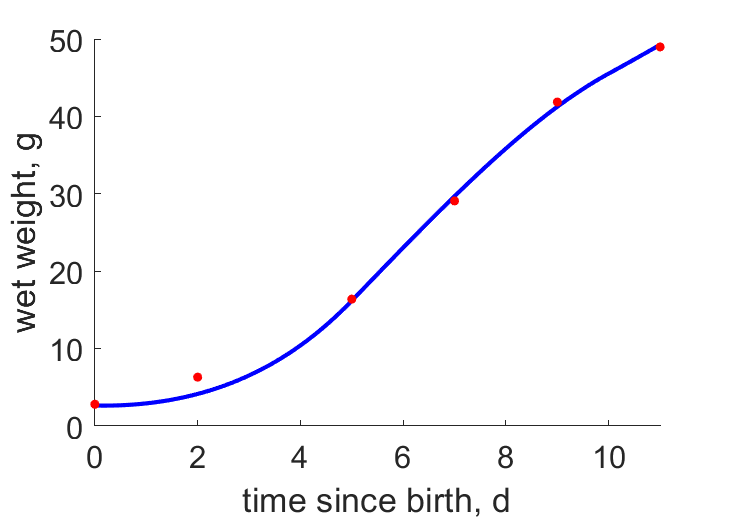Predictions & Data for this entry
| Model: std | climate: A | migrate: | phylum: |
| COMPLETE = 2.5 | ecozone: TPi | food: biCi, biHs | class: |
| MRE = 0.014 | habitat: 0iTd, 0iThh, 0iTg | gender: Dg | order: |
| SMSE = 0.000 | embryo: Tnpf | reprod: O | family: |
Zero-variate data
| Data | Observed | Predicted | (RE) | Unit | Description | Reference |
|---|---|---|---|---|---|---|
| ab | 14 | 14.11 | (0.008121) | d | age at birth | AnAge |
| tx | 12.5 | 12.56 | (0.00491) | d | time since birth at fledging | avibase |
| tp | 37.5 | 36.91 | (0.01568) | d | time since birth at puberty | guess |
| tR | 365 | 365 | ( 0) | d | time since birth at 1st brood | AnAge |
| am | 2555 | 2550 | (0.002006) | d | life span | AnAge |
| Ww0 | 3.95 | 3.791 | (0.04035) | g | initial wet weight | avibase |
| Wwb | 2.65 | 2.624 | (0.00995) | g | wet weight at birth | avibase |
| Wwi | 26.7 | 27.16 | (0.01734) | g | ultimate wet weight for females | avibase |
| Wwim | 31.75 | 31.78 | (0.00107) | g | ultimate wet weight for males | avibase |
| Ri | 0.02164 | 0.02145 | (0.009136) | #/d | maximum reprod rate | avibase |
Uni- and bivariate data
| Data | Figure | Independent variable | Dependent variable | (RE) | Reference |
|---|---|---|---|---|---|
| tW |  | time since birth | wet weight | (0.0278) | AguoCona1994 |
Pseudo-data at Tref = 20°C
| Data | Generalised animal | Copsychus malabaricus | Unit | Description |
|---|---|---|---|---|
| v | 0.02 | 0.03598 | cm/d | energy conductance |
| p_M | 18 | 801.3 | J/d.cm^3 | vol-spec som maint |
| k_J | 0.002 | 0.03197 | 1/d | maturity maint rate coefficient |
| k | 0.3 | 0.2928 | - | maintenance ratio |
| kap | 0.8 | 0.9231 | - | allocation fraction to soma |
| kap_G | 0.8 | 0.7982 | - | growth efficiency |
| kap_R | 0.95 | 0.95 | - | reproduction efficiency |
Discussion
- Body temperature is guessed, food availability varied
- Males are supposed to differ from females by {p_Am} only
- Ww0 was ignored because of inconsistency with tW data
- mod_1: Pseudo-data point k is used, rather than k_J; Data set tp and parameter t_R are added, the latter replacing clutch interval t_N. Postnatal T is based on PrinPres1991, see get_T_Aves. See further the revision page, theme puberty
Bibliography